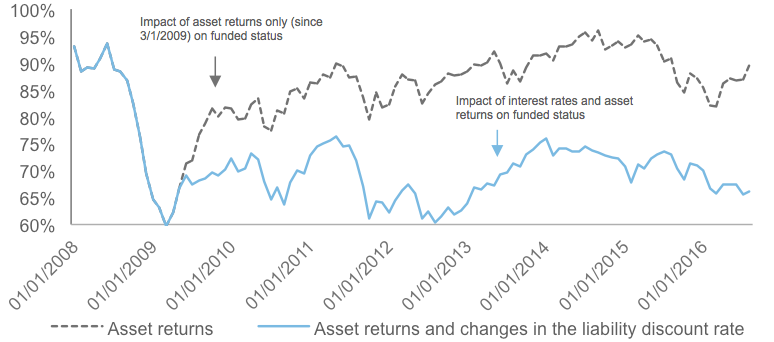US pension plans still haven’t recovered from the 2008 financial crisis—and low interest rates may be to blame, according to Russell’s Bob Collie.
“It’s been the liability side of the balance sheet—not the asset side—that has hindered the recovery.”Pension funding levels remain “stubbornly poor” more than seven years after the peak of the crisis due to liability increases, not falling asset values, the chief research strategist explained in a blog post.
“At its low in March, 2009, typical funded status (on a fully marked-to-market basis) had fallen by some 30%,” Collie wrote. “That was mainly the result of a sharp fall in asset values.”
But while asset values have since recovered, funding levels have not, he continued.
“Falling asset values dragged funding down, but it’s falling interest rates that have kept it down,” Collie argued. “It’s been the liability side of the balance sheet—not the asset side—that has hindered the recovery.”
Had interest rates remained unchanged, Collie said funded status would have fully recovered to pre-crisis levels by 2014 based purely on the impact of investment returns. Even given the decline in funding levels in the last two years, the average pension would still be roughly 90% funded today.
Instead, funded status for US pensions today is under 70%, showing little improvement since hitting 60% in 2009.
“The fall in the discount rate has prevented the recovery in funded status that would have otherwise occurred,” he argued.
And UK pensions are facing a similar issue: Across the pond, pension liabilities are priced relative to bond yields, which are at record lows following Brexit and the Bank of England’s August interest rate cut.
Consultant JLT Employee Benefits estimated that the aggregate deficit of UK private sector pensions had risen to a record high of £390 billion ($513 billion) at the end of July.
Persistently poor funding levels, Collie concluded, proved that investment returns alone were not enough.
“This highlights just how important it is for the two sides of the pension plan balance sheet to be managed together,” he said.
 Source: Russell’s Fiduciary Matters Blog
Source: Russell’s Fiduciary Matters Blog
Related: Poor Returns to Erase Years of US Public Pension Gains
